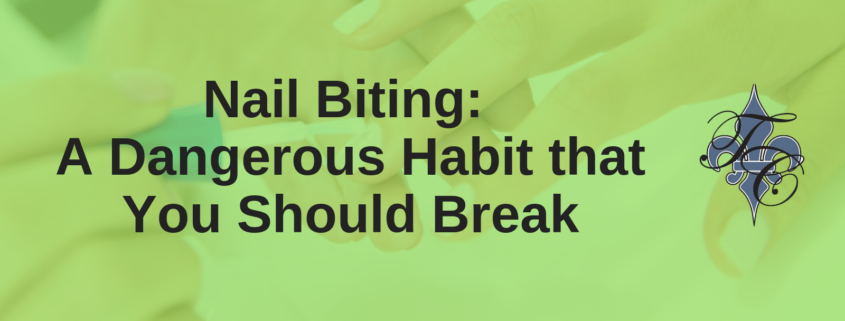Nail Biting: A Dangerous Habit that You Should Break
Do you bite your nails when you’re nervous? While this is a common habit, it can have negative effects on your oral health and general wellbeing.
From damaging teeth to breaking restorations, the consequences of nail biting on oral health are varied. Moreover, chewing on your fingernails can harm gums and expose the oral cavity to harmful bacteria. Biting your nails presents risks to your general health, too by cross contamination along with increased risks for skin infections, the flu, and common cold.
These reasons are why oral health professionals, including our Lafayette, LA dentist encourages patients to break this harmful habit.
What Biting Your Nails Does to Your Teeth
Teeth are incredibly strong but they are not immune to damage. Nail biting can cause permanent damage to our teeth, restorations, and prosthetics. In fact, chewing or biting on anything other than food can increase your risks for developing damaged dental structures.
Tooth Enamel Damage
Tooth enamel is a mineralized layer that surrounds teeth above the gum line. It serves as a barrier that protects the dentin structure of teeth from cavity-causing bacteria and strong acids. Nail biting, especially when this action is habitual, creates microscopic cracks in tooth enamel. Once these cracks form, the softer structures of teeth under tooth enamel are exposed to debris, bacteria, and acid. Worn tooth enamel increases a person’s risk for developing dental caries (cavities) and damage like chips and cracks.
Worn Dentition
The structure under tooth enamel can become worn, too—especially with repetitive actions like nail biting. The general wear and tear on teeth is accelerated when tooth enamel is worn because it’s easier for acid and harmful bacteria to attack teeth.
When nail biting leads to worn dentition, restorations like fillings, crowns, inlays, and onlays may be required to rebuild a patient’s bite and protect biological tooth structure from incurring more damage in the future.
Broken Restorations and Prosthetics
Biting down and chewing on your nails could affect expensive restorations and prosthetics. First, chewing and biting on inedible objects will weaken the materials that bond restorations to teeth. Weakening these bonding compounds can cause restorations and prosthetics to come loose or fall out.
Additionally, chewing and biting on non-food items like your nails can crack and chip the materials, such as porcelain, used to fabricate dental crowns and bridges.
How Biting Your Nails Affects Your Gums
Beyond harming teeth, restorations, and prosthetics, chewing on the sharp edges of your fingernails could lacerate the gingiva (gums) and other soft oral tissue like the lining of the lips. Any lacerations on soft oral tissue increase a person’s risks for developing oral infections. This fact is especially concerning considering that fingernails can harbor dangerous bacteria.
What Nail Biting Can Do to Your Health
As for your general wellbeing, it is important to consider the effects of nail biting on your overall health. Our hands and fingernails can harbor a multitude of germs, including pathogens for viruses like the cold or flu along with bacteria that could make you sick.
Raised Risks for Contracting the Common Cold, Flu, and Food-Borne Illnesses
Consider that our hands contact dozens of bacteria-filled surfaces each day, including as food preparation areas, bathrooms, and door handles. Placing our hands and/or fingernails in our mouth could lead to cross contamination that increases the risks for contracting the common cold and flu along with bacteria, like salmonella and e. coli, that contribute to food-borne illnesses.
Increased Risk for Skin Infections
Nail biting also raises one’s risks for developing skin infections, particularly around the cuticles and underneath nail beds. The sharp edges of our teeth can easily tear the delicate skin around fingernails. Any time there is a laceration of soft tissue, it increases a person’s risks for developing an infection because bacteria take advantage of open sores.
How to Break the Habit of Nail Biting
Most dental professionals, including our Lafayette, LA dentist, encourage patients to break the habit of nail biting. Breaking this habit could save you time and money spent on dental treatments caused by broken teeth and restorations, or treatments for oral infections.
Since nail biting commonly occurs as a response to anxiety and stressful situations, it is helpful to identify and avoid triggering circumstances that might fuel one’s compulsion to bite their nails.
Consider occupying your hands or mouth to break the habit. For example, chewing on sugar-free gum can help you fight the urge to chew on your nails. Playing instruments and engaging in physical activity can help combat stress while keeping your hands occupied, too.
Keeping your nails clean and trimmed along with properly washing your hands will help reduce your risks for skin infections, food borne illnesses, the cold, and the flu.
If it’s time for a dental checkup or cleaning, call our practice to reserve an appointment with our gentle Lafayette dentist.



